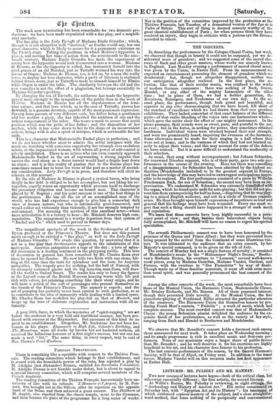tYt Chaim.
The week now terminating has been remarkable for two dramatic pro- auctions : we have been made acquainted with a fine play, and a magnifi- 'cent spectacle. The fine play is the Lady Tartufe of Madame Emile Girardin ; which, though it is not altogether well " motived," as Goethe would say, has one great character, which is likely to secure for it a permanent existence on the French stage. Taking the positions in which Moliere's hypocrite is placed, and moving her time of action from the seventeenth to the nine- teenth century, Madame Emile Girardin has shade the experiment of seeing how the hypocrite would look if converted into a woman. Madame de Blossac, as the she-impostor is called, has insinuated herself into the good graces of an old Marshal, just as Tartuffe wormed his way into the favour of Orgon ; Madame de Blossac, too, is led on, by a man she really loves, to display her true character, while a party of listeners is stationed behind divers doors, just as Tartuffe is made to unmask himself by Elmire while Orgon is under the table. The similarity between the old and the new comedies is not the effect of a plagiarism, but belongs essentially to Madame Girardin's problem. By changing the sex of Tartuffe, the authoress has made the hypocrite appeal more strongly to the sympathies of the public than in the work of Moliere. Madame de Blossac has all the impulsiveness of the femi- nine nature ; and that love which, as in the case of Tartuffe, proves her downfall, is a genuine devotion, capable of the most passionate expression. Sprung from parents of very different rank, her father being a gentleman and her mother a gipsy, she has inherited the ambition of one and the ardent temperament of the other. She wears a mask to secure that social position which was the pride of her father ; and the disposition of her mother, while it has come down to her in the shape of an inconvenient ardour, brings with it also a spirit of intrigue, which is serviceable for her ends.
This is a character that Mademoiselle Rachel plays to perfection ; and we do not know whether most to admire the artful intriguer with the mask on, watching with conscious superiority her triumph over credulous minds, or the impassioned woman, with whom all power of self-control is utterly annihilated. There is no actress who can even remotely approach Mademoiselle Rachel in the art of representing a strong impulse that carries the soul along as a fierce torrent would hurl a fragile boat down an abyss ; and it is this reality of passion that in the Racine plays has sometimes caused her to treat the verse of the poet as a matter of second- ary consideration. lady Tartufe is in prose, and therefore will elicit no censure on this account.
By the side of Madame de Blossac is placed a cynical baron, who being deeply in her debt is obliged to be her accomplice, but not liking his oc- cimation, eagerly seizes an opportunity which presents itself to discharge the pecuniary obligation and become an honest man. This character is played by M. Regnier ; and his quiet sarcasm is one of the best things in the performance. He has all the air of an accomplished man of the world, who has had experience enough to give him a somewhat dark view of human nature, but who is intrinsically good-humoured, and would rather act virtuously than viciously, if not too strongly tempted by self-interest. For securing the services of this excellent actor—whose mere articulation it is a luxury to hear—Mr. Mitchell deserves high com- mendation. The engagement is a worthy departure from that system of "Rachel and Co." which used to prevail in former days.


























 Previous page
Previous page